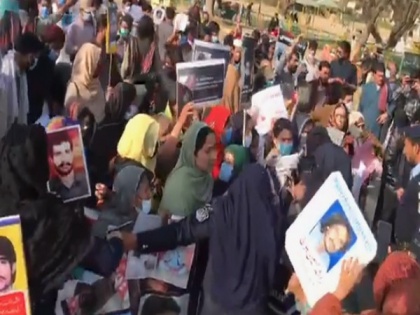Balochistan: Land of enforced disappearances
By ANI | Published: March 3, 2021 02:43 PM2021-03-03T14:43:03+5:302021-03-03T14:50:13+5:30
There are many heartbreaking stories of enforced disappearances in Pakistan's Balochistan province.

Balochistan: Land of enforced disappearances
There are many heartbreaking stories of enforced disappearances in Pakistan's Balochistan province.
According to an article that appeared in The Economist on July 24, 2017, "...In 2016 alone, 728 people across Pakistan suffered 'enforced disappearance', as counted by the commission of inquiry that investigates them. Some reappear alive and well, others as roadside corpses. The state flatly denies any unpleasantness," reported The News International.
A large number of political activists, intellectuals and students have gone missing in the Balochistan province of Pakistan in the past few decades.
The families allege Pakistan's spy agencies behind enforced disappearances, tortures and killings of these missing persons.
There are even reports of protesting family members being harassed by the spy agencies and security forces.
Fareeha (not her real name) recounts the ordeal of forced abduction of her fiancee in 2019. He was abducted on his way back from the Liaquat Memorial Library in Karachi.
After her fiance was picked up, his abductors came to her house looking for 'evidence.' When they did not find anything, they took her away as well for 'investigation.'
After several days of interrogation, Fareeha was set free but not her fiance.
Fareeha is only one of the several women that staged a week-long sit-in at D-chowk, Islamabad until a few days ago.
There were many others at the chowk, who were protesting against the 'enforced disappearances'.
The state's level of seriousness in addressing this issue can be gauged by the fact that the list of missing persons on the website of the Commission of Inquiry on Enforced Disappearances remains a blank page, reported The News International.
The people at the D-chowk sit-in represented 13 families of the 590 documented cases of enforced disappearances, some as far back as 10 years ago reported The News International.
One woman explained that many missing are not counted because their National Identity Card (NIC) details do not exist or their families lack the resources to register their cases.
The lack of transparency is the main problem. The state fails to bring charges against them (enforced disappearances), whom they arrest publicly. This, in turn, helps them to keep the abducted outside the purview of the law.
Most of the women at D-chowk are poor with little to no education. However, they could too understand that it's the state's responsibility to ensure due process of law. The abductees and their families are subjected to a perversion of justice that turns the presumption of innocence ('innocent until proven guilty') on its head, reported The News International.
Moreover, the collective lack of public interest, empathy and urgency to resolve this issue leaves a human being staggered.
The sparse coverage of the enforced disappearances in Pakistan's Balochistan is a matter of concern.
The problem lies in the lesser humans' characterisations of Balochs and Pashtuns, who are described as gun-wielding tribal people in Pakist culture.
Therefore, the sufferings of Balochs and Pashtuns disappearances are accorded a lower value than that of a family from mainstream urban Pakistan.
( With inputs from ANI )
Disclaimer: This post has been auto-published from an agency feed without any modifications to the text and has not been reviewed by an editor
Open in app